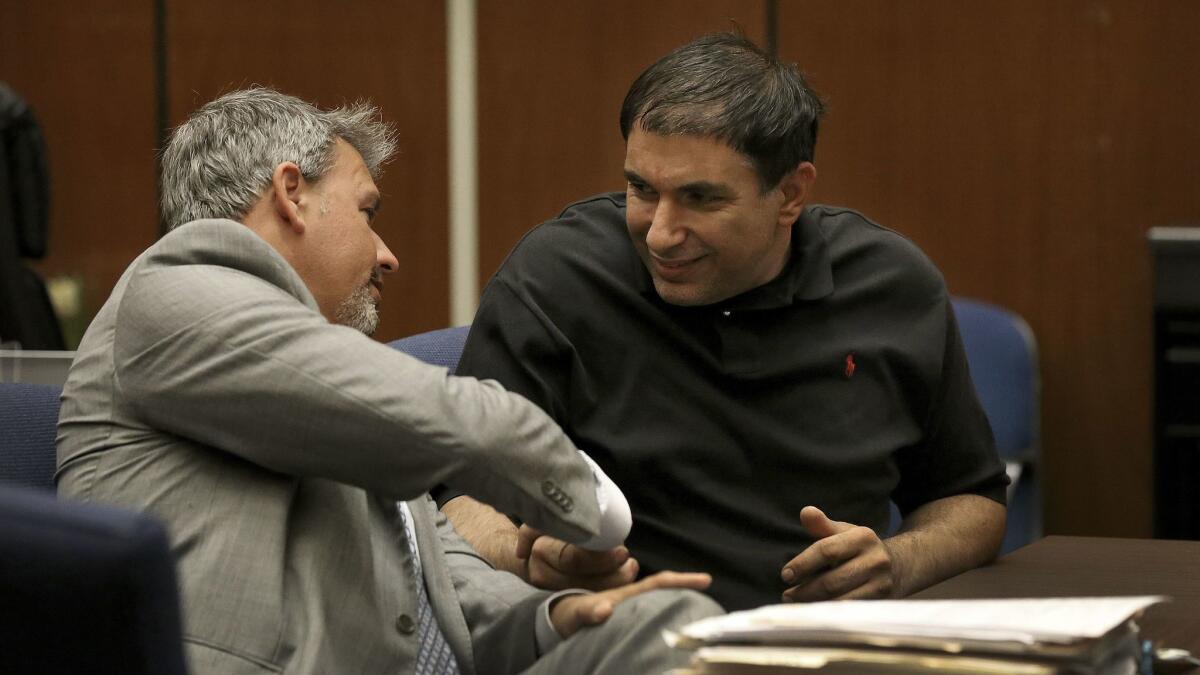Judge tosses conviction; says new jury could hear evidence questioning L.A. sheriff’s deputy’s credibility

A Los Angeles County judge threw out a man’s drug conviction Tuesday and granted him a new trial, ruling that his attorney should have acted on information that raised questions about the credibility of a key law enforcement witness during the trial.
Los Angeles County Sheriff’s Sgt. Justin Walter testified last year that he found methamphetamine and thousands of dollars in cash inside a sport utility vehicle after he’d pulled over the vehicle for an expired registration tag. His testimony led to the conviction of Emil Alseranai, 39, for drug possession for sale.
Alseranai discovered in a Google search during his trial that Walter had been found liable in an unrelated civil lawsuit accusing him and other deputies of using false evidence or false testimony in a man’s arrest, but Alseranai’s attorney at the time, Stuart Dumas, did not act on that information.
Superior Court Judge Michael Garcia said Tuesday that evidence of the prior civil jury verdict against Walter would have been relevant in Alseranai’s trial and could have changed the outcome of his case had it been presented by the defense. The judge questioned how Dumas, who hired a private investigator to help on the case, had not uncovered the civil judgment.
‚ÄúIt would have been relatively easy to conduct a simple record search‚ÄĚ to find the verdict against Walter, Garcia said.
Dumas did not immediately respond to a request Tuesday for comment. The district attorney’s office declined to comment.
The judge said that some evidence in the trial appeared to support the testimony of a witness who contested Walter’s version of events.
Alseranai‚Äôs girlfriend, Kristina Kay ‚ÄĒ who was driving the SUV at the time she and Alseranai were pulled over ‚ÄĒ had testified that she alone owned the drugs and cash. She also testified the drugs were found behind an air vent in the vehicle, not in a crevice between a seat and the vehicle‚Äôs console, as Walter had told the jury. Kay had added that the money was in her purse, not on the floor of the vehicle, as Walter testified.
‚ÄúThe case came down to a claim by Walter, the sole witness for the People, who conducted the stop and said he observed furtive movements in the car,‚ÄĚ Garcia said. He noted the new evidence could call into question the credibility of the prosecution‚Äôs only witness.
Garcia, however, did not agree with Alseranai’s other claim that Walter himself should have notified prosecutors in the criminal case about the jury verdict against him. The judge said neither prosecutors nor Walter suppressed the evidence because the jury verdict is public information that could have been found by defense counsel.
He instead concluded that the onus was on the defense, not on prosecutors or the deputy, to find out the information about Walter.
Under the landmark 1963 U.S. Supreme Court decision in Brady vs. Maryland, prosecutors must alert defendants to any evidence favorable to the defense, including information that could call into question the credibility of a government witness. Subsequent court decisions have indicated that this so-called Brady obligation extends to members of the prosecution team, which includes law enforcement officers, agencies, crime labs or any other entity that acts in partnership with prosecutors in a given case.
Alseranai’s attorney, Glen Jonas, said he was pleased his client won a new trial but expressed concern about the ruling.
‚ÄúThe judge‚Äôs ruling puts all defense attorneys on notice that it‚Äôs their obligation to find out about possible misconduct by officers,‚ÄĚ he said. ‚ÄúWhile my client won today, the citizens of Los Angeles lost a little.‚ÄĚ
In 2010, a federal civil jury found Walter and three other deputies liable for the use of false testimony or false evidence in a man’s arrest. Ronald Johnson sued the deputies, saying they falsely arrested him outside a Lynwood motel in 2008, planted cocaine on him and beat him, sending him to an intensive care unit for six days. Johnson was charged, but the case was later dismissed.
Walter did not immediately reply Tuesday to a call and messages seeking comment. He said in a previous interview that no false statements were ever used in Johnson’s case and that he believed the verdict stemmed from the jury’s apparent disapproval of a ruse used by deputies to entice Johnson to leave a building. He said using the ruse was legal.
Jonas also represented Johnson in the previous civil case against Walter. He said the judge’s ruling Tuesday potentially opens Walter up to cross-examination on the Johnson case in Alseranai’s retrial.
‚ÄúI‚Äôm relieved,‚ÄĚ Alseranai said outside the courtroom after his conviction was tossed. ‚ÄúI just want the truth to come out, the truth about dishonest cops.‚ÄĚ
Twitter: @mayalau
ALSO
A drug lab chemist is to blame for the largest dismissal of convictions in U.S. history
UPDATES:
6:05 p.m.: This article was updated to say the district attorney’s office declined to comment.
4:10 p.m.: This article was updated with a comment from Alseranai and his attorney and more details about the case and the judge’s ruling.
This article was originally published at 11:10 a.m.
More to Read
Sign up for Essential California
The most important California stories and recommendations in your inbox every morning.
You may occasionally receive promotional content from the Los Angeles Times.










